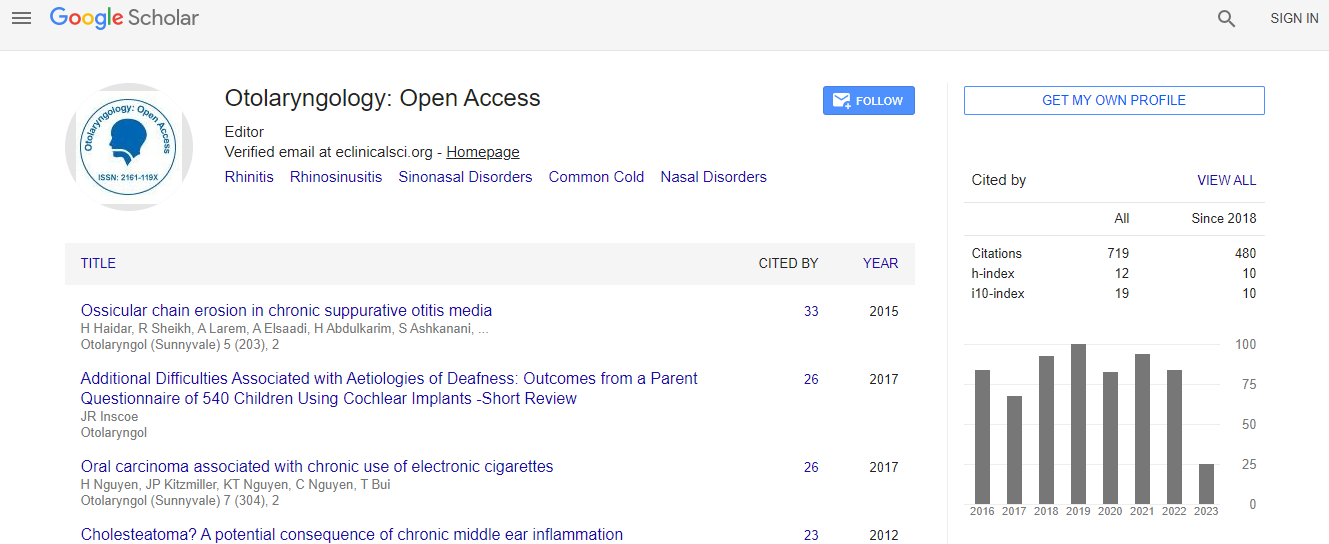Our Group organises 3000+ Global Events every year across USA, Europe & Asia with support from 1000 more scientific Societies and Publishes 700+ 91吃瓜 Journals which contains over 50000 eminent personalities, reputed scientists as editorial board members.
91吃瓜 Journals gaining more Readers and Citations
700 Journals and 15,000,000 Readers Each Journal is getting 25,000+ Readers
Citations : 925
Indexed In
- Index Copernicus
- Google Scholar
- Sherpa Romeo
- Open J Gate
- Genamics JournalSeek
- RefSeek
- Hamdard University
- EBSCO A-Z
- OCLC- WorldCat
- Publons
- Geneva Foundation for Medical Education and Research
- ICMJE
Useful Links
Recommended Journals
Related Subjects
Share This Page
Tubed supraclavicular flap reconstruction of total pharyngectomy defects for carcinoma hypopharynx
Joint Event on 4th European Otolaryngology-ENT Surgery Conference & 3rd International Conference on Craniofacial Surgery
Sashikanth Jonnalagadda
Fellowship in Head and Neck surgeryConsultant and Head, Department of Head and Neck Oncology and ENTAmerican Oncology Institute, India
ScientificTracks Abstracts: Otolaryngol (Sunnyvale)
Abstract
Carcinoma of Hypopharynx is challenging to manage because of the delayed presentation resulting in advanced nature of the disease at the time of diagnosis . In advanced cases with T3 and T4 tumors usually require total laryngectomy and total pharyngectomy and this results a reconstruction challenge because of the circumferential nature of the defect. Traditional reconstruction has been through gastric pull but recently tubed radial forearm free flap is increasing being employed in such reconstructions. Gastric pull has significant disadvantages because of the increased morbidity, need of second surgeon and prolonged hospital stay. Free Flap need micro vascular expertise not widely available and some postradiated patients are extremely challenging because of the recipient vessel status. Hence, we started using tubed supraclavicular flap in the reconstruction of total pharyngectomy defects and here we present our experience including the challenges encountered in 7 patients so far. 4/7 patients had post cricoid carcinoma and 3/7 had pyriform sinus carcinoma with extension to postcricoid region. 5/7 had salvage surgery following recurrence with Chemo-radiation. The indications for this type of reconstruction in our study included only circumferential defects with lower of the defect being above the thoracic inlet. Average length of defect was around 7 cms with range being 5.5 to 9 cm. Wide supraclavicular flap was harvested over the deltoid area usually from the side of the defect and tubed over a Montgomery salivary bypass tube before suturing over the defect.Complications included Pharyngo cutaneous fistula in 4 patients out of which 3 resolved with conservative treatment. We conclude that tubed supraclavicular flap is an easy less morbid alterative that should receive more attention in the reconstruction of circumferential defects which lie above the thoracic inlet.
Biography
Dr. Sashikanth Jonnalagadda has completed M.S (ENT) from Bangalore Medical College in 2005. Later he received Clinical Fellowship training in Rhinology at Lahey clinic, Boston, Massachusetts, (USA) and Clinical fellowship in Head and Neck surgery from Southern Illinois University, Springfield, Illinois (USA). Since 2012 he is working as Consultant and Head, Department of Head and Neck Oncology and ENT in American Oncology Institute, Hyderabad, India. His interests include Thyroid and parathyroid surgeries, Reconstruction in head and neck and endoscopic skull base surgery.
E-mail: drsashikanth@americanoncology.com

